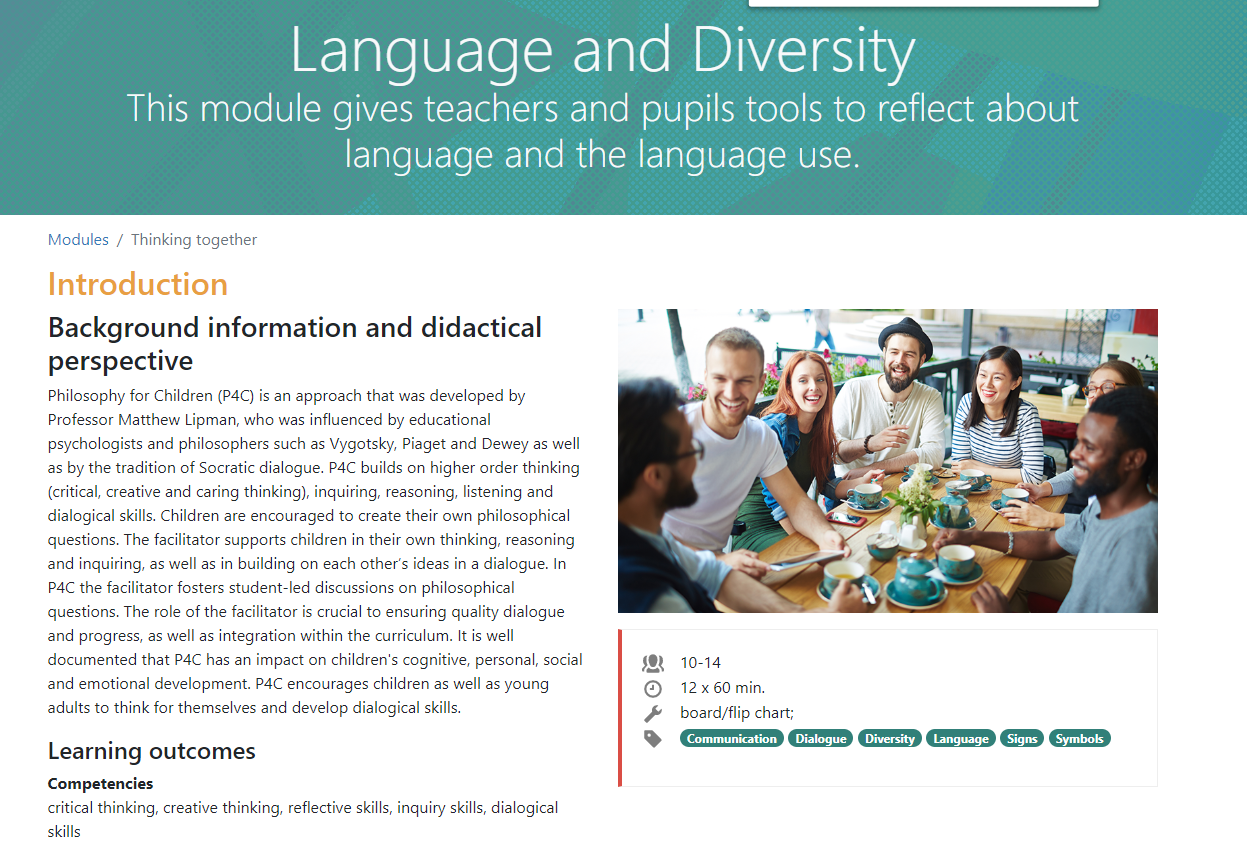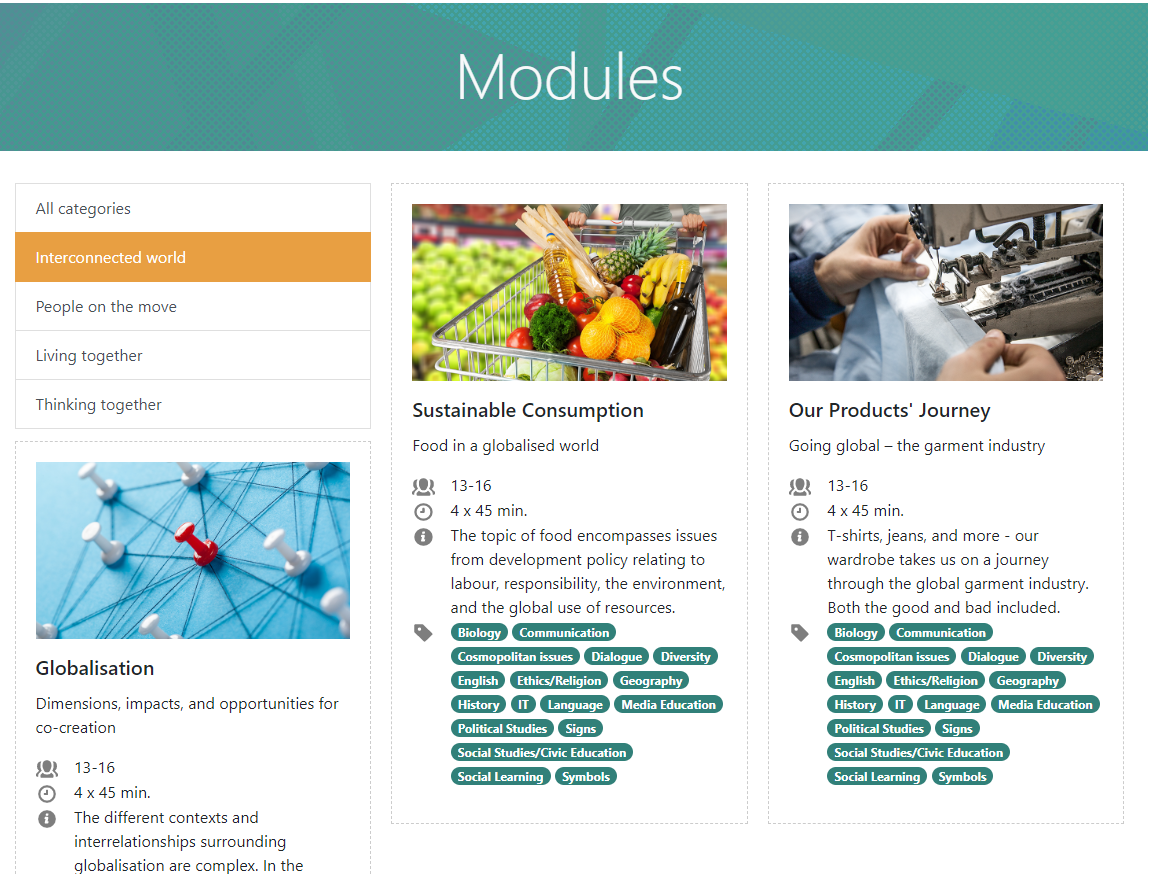Thanks to the funding from the Erasmus+ sub-program of Support for Policy Reform, under the auspices of Social Inclusion through Education, Training and Youth, a new e-learning platform for educators is here. This platform offers educators a complete curriculum for implementing philosophical inquiry in classrooms, modules for teaching about diversity and global issues, as well as a media library with a collection of approaches from different countries, and materials in different languages. The topics discussed include the following: sustainable consumption, globalization, our products’ journey, escape from war and persecution, diversity in football, human rights, islamophobia and others.
You may want to check the platform using this link: https://eduskills.plus/en. Modules are ready to be used.

Where does the need for this platform stem from?
We live in a time of great uncertainty and change. The acceleration of globalization has numerous effects and reaches all the way into people’s lives, as well as into European classrooms. Increased migration and cultural diffusion leads to new forms of behaviour and thought. This often goes hand-in-hand with the weakening of pre-globalization localised ways of life. Technological advances, in particular the new forms of digital media, change the way we interact with each other as well as the way we perceive information and knowledge. If an individual fails to adequately contemplate these changes and how they relate to our own individual lives there is a risk of fear, exclusion, disengagement with society and, in extreme circumstances, violent radicalization.
All this puts pressure on schools and teachers to understand the constantly evolving global situation and prepare students for this new world. This requires the development of specific educational strategies, aimed at fostering intercultural dialogue and the construction of new identities that emerge from the possibilities presented by our engagement with the Other. Such educational strategies can offer effective cognitive and social tools through which to address prejudices and stereotypes and which prepare students for active citizenship in a diverse and complex society.
The starting point for this project is the idea of philosophical inquiry in a community of inquiry and its underlying cosmopolitan ideal. It provides an educational method through which children are able to develop the capacity to reflect in a critical, creative and caring way on the multiple, fluid and interactive nature of the social reality in which we live. Children – future citizens, equipped with such skills will be able to construct a cosmopolitan society, which will be democratic, inclusive, open and open-ended. Such education is based on the transaction between self, the other and the world in what is understood as “reflective loyalty to the known and openness to the new”.

What is the purpose and objectives of the platform?
The purpose of this project is thus to offer to the teachers of Europe educational strategies for cosmopolitan engagement. This is achieved by enabling teachers to develop the necessary skills and by offering materials for practical employment of these principles in classrooms. It promotes the idea of shared humanity. This kind of cosmopolitan education can help to shape the way that people live and interact with each other, and can prepare children for understanding fundamental human rights, democratic values, and intercultural dialogue, as well as motivating them to become active and engaged citizens. All these traits prevent people from falling prey to radicalization, simplified interpretations of the world (among them nationalism), or social and political inaction. The platform was created hoping to reach the following specific educational goals:
– To help students and teachers develop a cosmopolitan frame of mind by combining (a) openness to what is new, with (b) a reflective engagement with their own particular culture, tradition, and identity;
– To foster a sense of European citizenship based on understanding and respect for human rights and democracy;
– To challenge stereotypes through reflective engagement with different cultures and by promoting the importance of combating racism, prejudice, and xenophobia;
– To inform teachers and students about globalism and the processes of global interaction;
– To promote critical thinking and its use when reading and using new forms of digital media;
– To foster the cognitive and affective skills needed by children to cope with the challenges of living in multicultural societies;
– To enhance the European dimension of teacher training;
– To support improvements in pedagogical approaches to global, cosmopolitan and social issues;
– To promote awareness of the importance of cultural and linguistic diversity in Europe;
– To promote equality and contribute to combating all forms of discrimination based on sex, racial or ethnic origin, religion or belief, disability, age or sexual orientation;
– To contribute to more equal, welcoming and nurturing learning environments.
To reach these objectives we combined the findings and results of several successful projects and initiatives implemented in school education in several countries. We built a multilingual platform for educators, where they can find information and materials to face the current educational challenges and contribute to the above goals. The platform informs educators on ways in which they can handle the growing diversity in their classrooms, the rise of uncertainty in society, the increased globalization as well as the fact that dogmatic educational strategies are no longer suited for students who are daily faced with a myriad of opinions and perceived truths on the internet and have to navigate among them to create their own understanding of the world.
How can I stay updated and receive the newest information regarding the platform?
If you are interested in using the platform and want to know when it will be complete, you can stay in touch with us on FB: https://www.facebook.com/eduskills.plus/